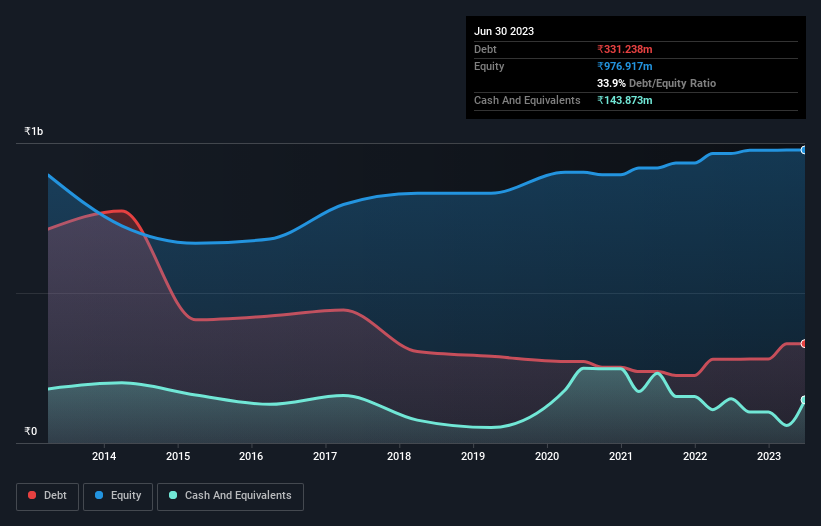
The external fund manager backed by Berkshire Hathaway's Charlie Munger, Li Lu, makes no bones about it when he says 'The biggest investment risk is not the volatility of prices, but whether you will suffer a permanent loss of capital.' So it seems the smart money knows that debt - which is usually involved in bankruptcies - is a very important factor, when you assess how risky a company is. We note that Bang Overseas Limited (NSE:BANG) does have debt on its balance sheet. But should shareholders be worried about its use of debt?
When Is Debt A Problem?
Generally speaking, debt only becomes a real problem when a company can't easily pay it off, either by raising capital or with its own cash flow. Part and parcel of capitalism is the process of 'creative destruction' where failed businesses are mercilessly liquidated by their bankers. However, a more usual (but still expensive) situation is where a company must dilute shareholders at a cheap share price simply to get debt under control. By replacing dilution, though, debt can be an extremely good tool for businesses that need capital to invest in growth at high rates of return. When we examine debt levels, we first consider both cash and debt levels, together.
Check out our latest analysis for Bang Overseas
How Much Debt Does Bang Overseas Carry?
The image below, which you can click on for greater detail, shows that at March 2023 Bang Overseas had debt of ₹331.2m, up from ₹279.1m in one year. However, it does have ₹143.9m in cash offsetting this, leading to net debt of about ₹187.4m.

How Healthy Is Bang Overseas' Balance Sheet?
The latest balance sheet data shows that Bang Overseas had liabilities of ₹595.0m due within a year, and liabilities of ₹75.0m falling due after that. Offsetting this, it had ₹143.9m in cash and ₹637.8m in receivables that were due within 12 months. So it actually has ₹111.8m more liquid assets than total liabilities.
It's good to see that Bang Overseas has plenty of liquidity on its balance sheet, suggesting conservative management of liabilities. Because it has plenty of assets, it is unlikely to have trouble with its lenders. When analysing debt levels, the balance sheet is the obvious place to start. But you can't view debt in total isolation; since Bang Overseas will need earnings to service that debt. So if you're keen to discover more about its earnings, it might be worth checking out this graph of its long term earnings trend.
Over 12 months, Bang Overseas reported revenue of ₹1.2b, which is a gain of 26%, although it did not report any earnings before interest and tax. With any luck the company will be able to grow its way to profitability.
Caveat Emptor
Despite the top line growth, Bang Overseas still had an earnings before interest and tax (EBIT) loss over the last year. Indeed, it lost ₹11m at the EBIT level. On a more positive note, the company does have liquid assets, so it has a bit of time to improve its operations before the debt becomes an acute problem. But we'd be more likely to spend time trying to understand the stock if the company made a profit. So it seems too risky for our taste. The balance sheet is clearly the area to focus on when you are analysing debt. But ultimately, every company can contain risks that exist outside of the balance sheet. These risks can be hard to spot. Every company has them, and we've spotted 3 warning signs for Bang Overseas (of which 2 are a bit concerning!) you should know about.
When all is said and done, sometimes its easier to focus on companies that don't even need debt. Readers can access a list of growth stocks with zero net debt 100% free, right now.
Valuation is complex, but we're here to simplify it.
Discover if Bang Overseas might be undervalued or overvalued with our detailed analysis, featuring fair value estimates, potential risks, dividends, insider trades, and its financial condition.
Access Free AnalysisHave feedback on this article? Concerned about the content? Get in touch with us directly. Alternatively, email editorial-team (at) simplywallst.com.
This article by Simply Wall St is general in nature. We provide commentary based on historical data and analyst forecasts only using an unbiased methodology and our articles are not intended to be financial advice. It does not constitute a recommendation to buy or sell any stock, and does not take account of your objectives, or your financial situation. We aim to bring you long-term focused analysis driven by fundamental data. Note that our analysis may not factor in the latest price-sensitive company announcements or qualitative material. Simply Wall St has no position in any stocks mentioned.
About NSEI:BANG
Bang Overseas
Engages in the manufacturing and trading of textile and textile products in India and internationally.
Mediocre balance sheet and slightly overvalued.
Similar Companies
Market Insights
Community Narratives



